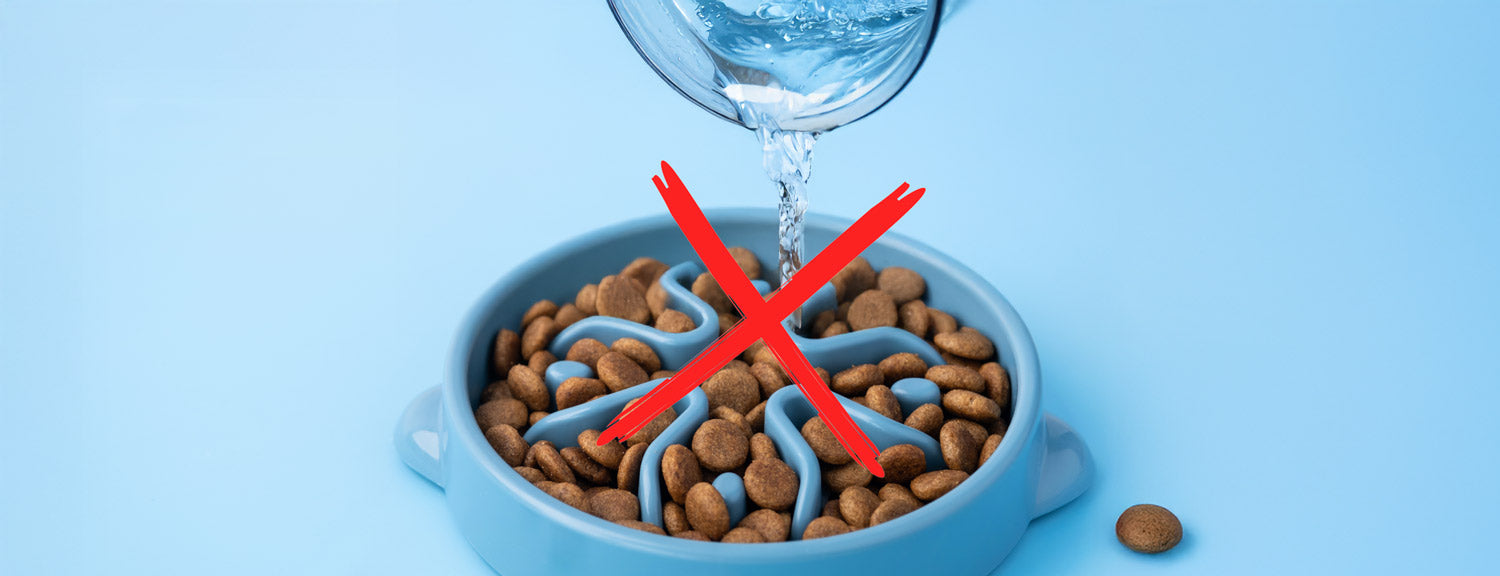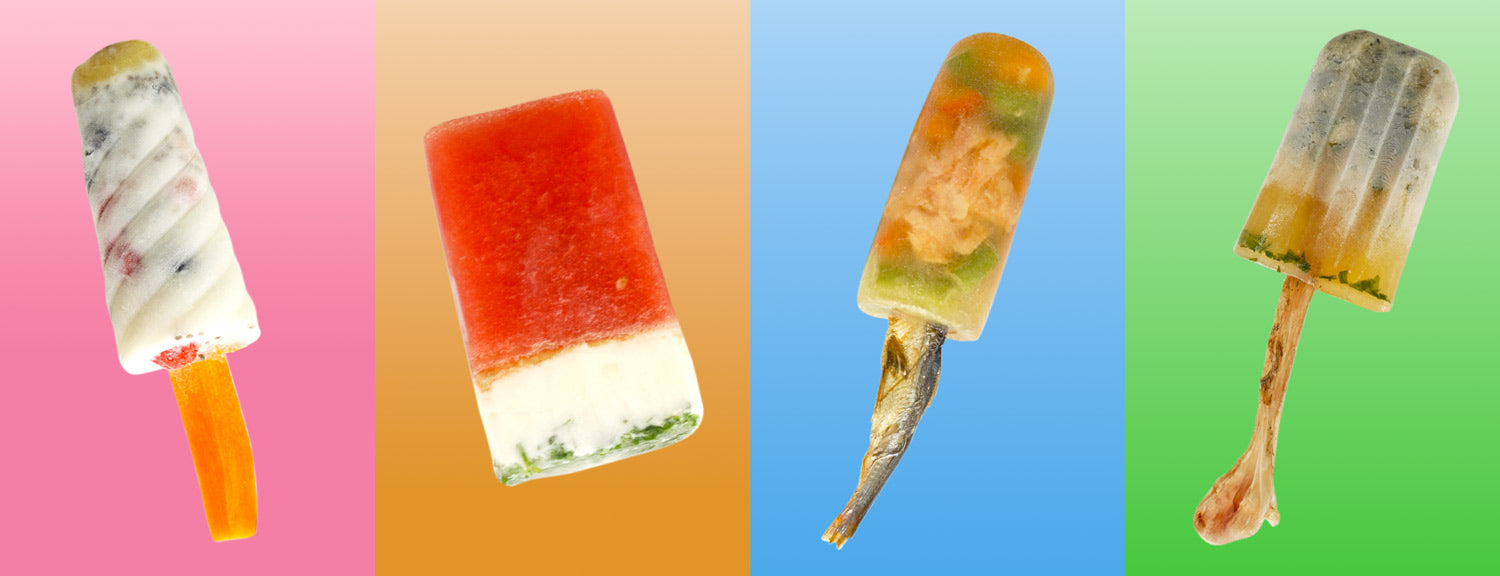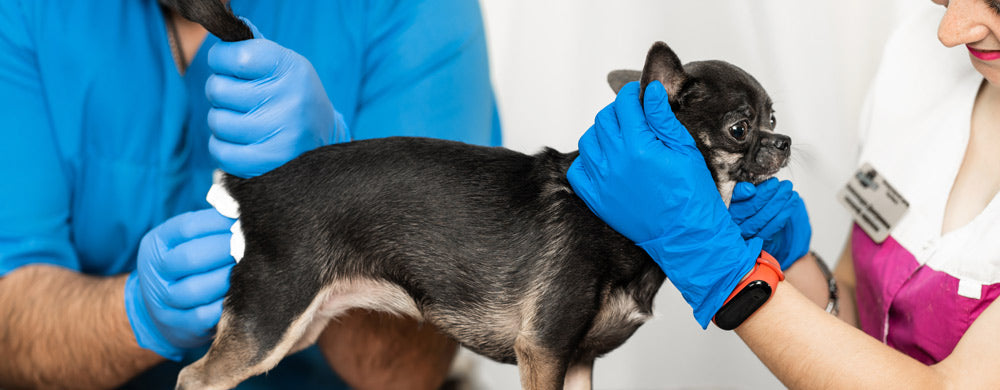Your basket is empty

How to Make Your Senior Dog Comfortable
June 11, 2022 7 min read
As dogs become older, they require additional support and care to keep them comfortable and healthy. Alongside different dietary requirements, your senior dog needs low-impact exercise, extra assistance with keeping themselves clean, and modifications around the home to improve their quality of life.
If you’re currently caring for an elderly pooch or just want to be extra prepared, we’ll be covering all the basics on how to make your old dog comfortable during seniorhood.
***
Nutrition and Diet
While a good diet is crucial in every aspect of your dog’s life, it’s especially important once they reach their senior years. As dogs age, their bodies go through a number of physical and mental changes, including reduced muscle mass, dry skin, cognitive decline, poor mobility, and a slower metabolism.
The right nutrition can help manage age-related issues and decrease the intensity of them, keeping your pooch strong and healthy in the later stages of life.
Elderly dogs need fewer calories than puppies and adults as a slower metabolism means they are at a higher risk of obesity, as well as health problems associated with being overweight, such as diabetes, heart disease, and osteoarthritis.
Ideally, you should be feeding your older dog a dry, wet or raw food that is targeted for seniors as it will contain the right balance of protein, calories, fat, etc. Compared to younger dogs, older pooches require around 50% more protein in their diets to prevent the loss of muscle mass.
Dog food that contains between 28 to 32% of protein is an adequate amount for seniors, according to veterinarian Ernie Ward, founder of the Association of Pet Obesity Prevention. Make sure the food you feed your companion contains a high-quality protein source like meat and fish.
Cheaper protein sources like potato and soy are a lot harder to digest, particularly if your pooch suffers from gastrointestinal issues. However, too much protein in your dog’s diet can be detrimental to their health and lead to kidney problems. That’s why it’s important to find the right balance.
***
Supplements
In addition to feeding your older canine a diet that’s low-calorie, low-fat, and relatively high in protein, supplements like vitamin A, E, omega-3, chondroitin, and glucosamine can all be beneficial to your pooch’s overall health.
Antioxidants from fruits such as blueberries, blackberries, and raspberries can improve memory and cognitive function in elderly dogs. You can feed your pooch dog-safe fruits and vegetables high in antioxidants or add supplements like vitamin C and vitamin E.
Many elderly dogs suffer from osteoarthritis and poor mobility, so adding chondroitin and glucosamine to your companion’s diet can be a great way to increase their flexibility. They work by protecting the cartilage in the joints and preventing further damage.

Our MOBI supplement provides dogs with all necessary nutrients needed for maintaining healthy joints at every stage of their life |works wonders for dogs suffering from osteoarthritis and other joint issues|. It contains glucosamine, chondroitin, green-lipped mussel, MSM, and curcumin (turmeric) to give older dogs some extra support when it comes to their hip and joint health.
All of these ingredients are known for their anti-inflammatory properties, providing relief from stiffness and pain.
Omega fatty acids are also advantageous in an elderly dog’s diet as they improve cognitive function, support the heart, soothe dry and flaky skin|assist with dry or flaky skin|, reduce the symptoms of arthritis, and much more.
If you’re looking to add omega fatty acids to your dog’s diet, our OMEGA and SALMA supplements should be staples in your pet supplies cupboard. The former is a 100% natural fish oil supplement containing omega fatty acids like EPA, ALA, DHA, OA, as well as vitamin E for a healthy coat, heart, brain, and joints.
SALMA works similarly by providing support to heart, brain, and immune system health, while also alleviating itching and dry skin. It contains vitamin E and prime Scottish salmon, the latter of which has been ethically extracted and micro-filtered for optimal purity. This allows your dog’s body to quickly and efficiently absorb the omega-3 for maximum effectiveness.
Although supplements can be an excellent way to give your dog some extra nutrients and support, it’s best to speak to your vet before you make any changes to your pooch’s diet.
***
Exercise
It’s not uncommon for dogs to be less energetic and active once they hit their senior years, but that doesn’t mean you can skimp on the walks - far from it! Adequate exercise is crucial for keeping elderly canines in good shape, both mentally and physically.
Aim for at least 30 minutes of exercise every day, making sure to give your companion plenty of breaks so they don’t get worn out.

As mentioned earlier, seniors are more prone to obesity due to a slower metabolism, so an active lifestyle will help your pooch maintain a healthy weight. Additionally, low-impact exercises like walking and swimming can help prevent the onset of some ailments like muscle loss and arthritis.
Bear in mind that seniors are more sensitive to hot and cold temperatures, so make sure you keep an eye on the weather before you take your pooch for a walk. Investing in a thermal coat and paw protectors can help you keep your companion warm during cold temperatures, whereas walking in the late evening or early morning can help you avoid the sun when it is hot.
In addition, it’s best to stick to surfaces like grass and sand - both gravel and asphalt can get very warm in hot temperatures, which could hurt your dog’s paws.
If you notice your dog is slow during a walk or spot any symptoms like stiffness or pain after an outing, you might want to reduce the duration of daily walks.
***
Grooming
Older dogs often suffer from dry skin and a thin coat due to reduced cell activity, so it’s more important than ever to keep on top of grooming. You’ll want to make sure you use the right brush for your dog’s coat type. Brushes with soft bristles are ideal for dogs with skin issues or short coats.
If your companion has medium to long fur, a slicker brush or pin brush is your best option. Dogs with double coats will need to be brushed at least once a week to keep mats and tangles at bay, whereas dogs with short, smooth coats only need to be brushed every couple of weeks or so.

A de-shedding tool can be beneficial for removing some of the undercoat in dogs with long or double coats to keep their skin healthy.
Seniors are also more prone to allergic dermatitis, so you may notice your pooch’s immune system reacting more aggressively to allergens like dust, pollen, and other irritants.
Speak to your vet if you suspect your dog is suffering from allergic dermatitis as they can prescribe antihistamines to lessen symptoms. Supplements containing vitamin E and omega fatty acids like OMEGA and SALMA can also give your pooch’s skin some much-needed nutrients to reduce dryness and itchiness.
***
Bathing
Self-grooming can be more challenging for elderly dogs due to decreased mobility and flexibility. Your pooch may have difficulty reaching certain areas like their bottom, so semi-regular baths are crucial for hygiene.
Monthly baths with dog shampoo are usually sufficient, though you may need to clean your pooch more frequently if they are sick, incontinent, or frequently suffer from UTIs. Older dogs, especially female dogs, are more prone to UTIs.
Regular grooming and bathing, particularly around the urinary opening, can help prevent bacteria from reaching your dog’s urinary system. A healthy diet, plenty of access to clean water, and supplements that contain cranberry, d-mannose, and marshmallow root-like BERRI can also lessen the likelihood of your dog developing a UTI and leaky bladder.
***
Nail and Dental Care
Although regular brushing and bathing is a key component of your senior dog’s grooming routine, so is teeth and nail care. Dental disease and tooth loss are common in senior dogs, so cleaning your companion’s teeth at least three times a week (ideally, every day!) with a soft toothbrush and dog toothpaste will help keep tooth decay, gingivitis, and tartar buildup at bay.

Chew toys, dental treats sticks, and supplements containing seaweed and kelp such as CHOMPER can help promote healthy and strong teeth, as well as reduce the formation of plaque.
Keeping your dog’s nails short using nail clippers or a grinder is another vital part of grooming, otherwise, the nails will become overgrown, which can lead to pain or irreversible damage. Overgrown nails can also cause your dog to slip or fall over easily - this can be dangerous in elderly canines as their bones are weaker, making injuries more likely.
Monthly or bi-weekly nail trimming should be adequate for keeping your dog’s nails healthy. If you hear a clicking sound as your dog walks, that’s a sign that their nails are a bit long and could do with cutting.
***
Home Adjustments
A healthy diet, daily exercise, and regular grooming aren’t the only things that need changing to keep your pooch comfortable once they enter their senior years. You may need to make some adjustments around your home to make daily life a little easier for your companion.
Elderly dogs with poor mobility or joint issues may find it difficult to access steps, cars, furniture, etc, so installing ramps around the home can help your companion move around more easily. In addition, you might want to raise your dog’s food and water bowls so they don’t have to bend down as much.
Using anti-slip mats made from rubber or carpet is ideal for putting on stairs and slippery surfaces like tile and laminate flooring to give your pet more balance. Alternatively, you might want to block off stairs with a baby gate if you’re worried your dog will hurt themselves.
Many senior dogs suffer from incontinence or canine cognitive dysfunction (similar to Alzheimer's), the latter of which can cause dogs to behave differently and forget basic training. Putting your dog’s bed near the backdoor or installing a dog flap can help your pooch easily access your garden when they need the toilet.
You may need to place potty training pads around the house to prepare for any accidents, especially overnight.
***
Final Thoughts
While caring for an old dog does require you to make a few adjustments to their diet, exercise routine, grooming schedule, and home life, it’s not much more work or responsibility than looking after an adult dog. Seniors simply just need a little extra support to keep them healthy and happy.
Decreasing your old dog’s calorie intake and sticking to regular but low-impact exercise will help them stay in shape, whereas increasing the amount of protein and nutrients they consume can promote good health.
Supplements like MOBI, OMEGA, SALMA, BERRI, CHOMPER, and VITIA can be great additions to your older dog’s diet, giving their body a boost in the areas they need it the most. As always, make sure you speak to your vet before adding supplements to their diet or if you’re concerned about their health.
Also in Pet Advice

Should You Add Water to Your Dog’s Kibble? Here’s What the Science Says
August 14, 2025 7 min read
Should you add water to your dog’s kibble? Discover the science-backed pros, cons, and better alternatives like bone broth and fresh food to improve hydration, digestion, and overall canine health...

DIY Frozen Dog Treats Your Pup Will Love
June 27, 2025 4 min read
Summer heat can be dangerous for dogs, making hydration more important than ever. Learn how to spot signs of dehydration, boost your pup’s water intake, and create fun, frozen recipes to keep them happy and healthy all season long.

Why Is My Dog Scooting? Common Causes and How Diet Can Help
May 09, 2025 4 min read
If your dog is scooting or smells fishy, it could be due to blocked or irritated anal glands. Learn what causes blocked anal glands, which dogs are most at risk, and how simple dietary changes—like adding fibre and anti-inflammatory nutrients—can help prevent recurring problems.
